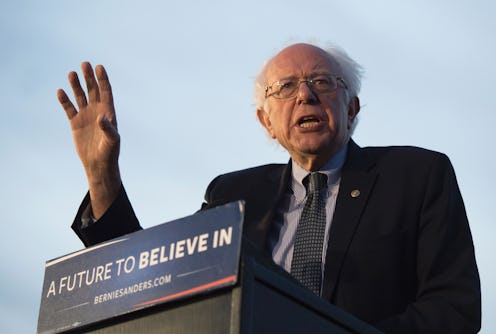News
This Could Be A Tough Decision For Bernie Sanders
Well, that was not the night a certain Vermont senator was looking for. Bernie Sanders suffered a resounding defeat on Tuesday, losing the New York primary to former Secretary of State Hillary Clinton by double-digits, and widening his already nearly insurmountable pledged delegate deficit. No matter how you slice it, it's a bad day for Team Bernie, and with the math being what it is, you might even feel reason to wonder: could Bernie Sanders still run as a third party candidate?
It's a notion that's been floated before in this presidential primary season, but not on the Democratic side — it's been Republican frontrunner Donald Trump who keeps alluding to the possibility of a third-party run, part of his ongoing verbal fisticuffs with the Republican National Committee and chairman Reince Priebus. But Sanders' occasional clashes with the Democratic National Committee have been no secret, either, as his campaign actually filed a lawsuit against the DNC back in December, and this week launched accusations of Clinton and the DNC violating campaign finance law — allegations that both the Clinton campaign and the DNC have adamantly spoken out against.
But that's still a far cry from actually running against the Democratic nominee in November, a decision which would almost surely dramatically increase the odds of a Republican winning the White House.
But, setting aside if he should, could he? Yes, he could! There's no reason he couldn't, beyond the potentially prohibitive costs of running a campaign without the backing of a major party, and of course, the trouble of finding a party that wanted to take him on as its nominee. That last part would potentially be the biggest issue — where would he land, and would it be a known name that lent him any credibility whatsoever?
It'd be an incredibly steep hill to climb at this point, basically. Although if anybody could do it, he could — he's certainly got a lot in the way of campaign finances, and the name recognition, popularity and enthusiasm to generate more. He wouldn't face the same getting-to-know-you hurdle that other third-party presidential candidates do, in other words. In fact, if there's any cast-off from the major party primary process that plenty of progressive third parties would want to have, you have to bet it'd be Sanders and his "political revolution."
However, the question of what party he'd land on, and whether he'd be able to get on the ballots in every state — those are sticky questions. State rules for getting on the general election ballot vary widely from one to the next, but in many cases he's already missed deadlines. In other words, while he could run as a third party candidate, but it'd be little use if it didn't even get his name on the ballot. He'd be stuck resorting, then, to a write-in candidacy.
One other option, however, is to mount an independent run. As John Avlon noted for The Daily Beast in January while assessing a theoretical Michael Bloomberg run, running as an independent would give Sanders the time he needs to meet ballot filing deadlines, and it ostensibly wouldn't pose as big a problem for him as it would for some — the Bernie brand is surely big enough at this point for people to back him, regardless of whether he's hitched to a party.
But here's the rub: Sanders himself has maintained that he won't do this. At least, that's what he said when his campaign was in its early stages. Back in September 2015, as Rebecca Kaplan detailed for CBS News, Sanders was pretty uncompromising on this point.
What I did not want to do is run as a third party candidate, take votes away from the Democratic candidate and help elect some right-wing Republican. I did not want responsibility for that. So what I said at the beginning of the campaign is that I was not going to run as an independent. And I say it now, that if I do not win this process I will not run as an independent.
Now sure, Sanders could go back on his word, whether it was to try to latch onto a different party process or to run as an independent, but that's a pretty straightforward pledge right there, as far as pledges go. And he hasn't said anything to give anyone any reason to think otherwise — even as the New York primary was going on, Sanders was campaigning in the state of Pennsylvania. In other words, he clearly did not look like a man resigned to the idea that he's going to lose this Democratic race, and he sounds as though he understands all too well how dangerous a three-way race splitting the progressive movement would be.
